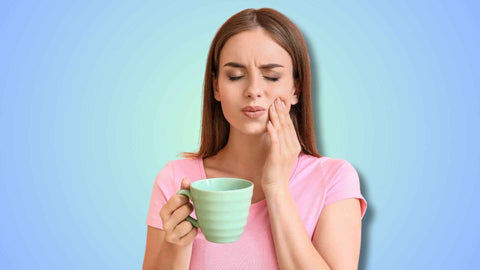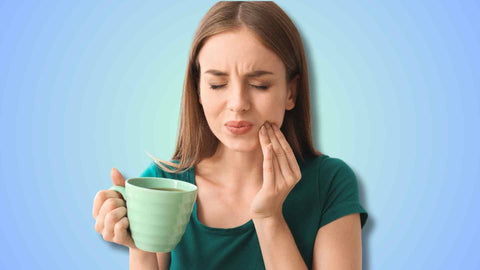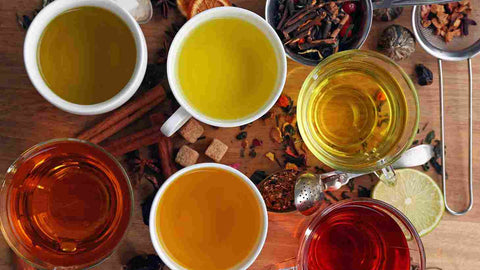Does Tea Cause Cavities?
Tea itself does not directly cause cavities; in fact, certain types of tea can offer protective benefits against dental cavities when consumed properly.
Black and green teas, for example, contain catechins, which have antibacterial properties that can inhibit the growth of cavity-causing bacteria in the mouth, such as Streptococcus mutans.
Additionally, the fluoride content found in some teas can help strengthen tooth enamel, further reducing the risk of cavities by aiding in the remineralization process.
However, the way you enjoy your tea can influence its impact on your dental health. For example with green tea consumption, adding sugar increases the risk of cavities, as the sugar can feed harmful oral bacteria that produce acids, leading to tooth decay.
Similarly, acidic flavored teas or those with added citrus fruits can erode tooth enamel over time if consumed frequently. It's the same phenomenon you'll find with coffee and cavities.
To enjoy the benefits of tea without increasing your risk of cavities, you should drink it plain without added sugars and practice good oral hygiene, including regular brushing and flossing. This approach allows you to harness the oral health benefits of tea while minimizing potential negative effects.
In this article, I'll explain everything you need to know about the impacts of tea on your oral and overall health.
How does tea affect our oral health?

Tea can have a complex impact on oral health, offering both benefits and potential drawbacks depending on the type of tea and how you consume it. In this section, we'll walk through some of the impacts.
Antibacterial Properties
Certain types of tea, especially green tea, contain catechins and theaflavins, which have antibacterial properties.
These compounds can help reduce the bacteria in the mouth, particularly Streptococcus mutans, which is known to cause tooth decay and cavities. By inhibiting the growth of harmful bacteria, tea can contribute to a healthier oral environment.
Fluoride Content
Tea leaves naturally accumulate fluoride from the soil, which means that brewed tea can contain this mineral.
Fluoride is known for its ability to strengthen tooth enamel and make it more resistant to decay. Regular consumption of tea, therefore, can provide a supplementary source of fluoride, aiding in the prevention of cavities.
Reducing Inflammation and Gum Disease
The antioxidants present in tea, such as polyphenols, can also play a role in reducing inflammation in the gums, potentially lowering the risk of gum disease. Gum disease, or periodontitis, is a significant cause of tooth loss and poor oral health, and managing inflammation is key to prevention.
Teeth Staining
One of the most common concerns with tea consumption, especially with darker teas like black tea, is its potential to stain teeth. The tannins in tea can lead to tooth discoloration over time, such as yellow or brown stains, especially if tea is consumed in large quantities.
Acidity
While generally less acidic than coffee, some teas, particularly fruit teas or those with added flavors, can be quite acidic. Regular exposure to acidic beverages can erode tooth enamel, making teeth more susceptible to decay.
Impact of Added Sugars
Like any beverage, the health benefits of tea can be significantly diminished if sugar is added. Sugar increases the risk of cavities and can counteract the antibacterial benefits of tea.
Is tea bad for your teeth?

Tea, in moderation, isn't inherently bad for your teeth, but it's important to be aware of how its consumption can affect your dental health.
The tannins present in tea, especially darker varieties like black tea, can lead to teeth staining. These natural compounds bind to the enamel, the protective outer layer of your teeth, causing discoloration over time.
Additionally, tea's acidity, particularly pronounced in fruit-flavored teas, can contribute to enamel erosion. This process weakens your teeth, making them more prone to decay and sensitivity.
However, it's not all bad news; tea also offers benefits, such as antioxidants, which have overall health benefits, and certain types have been shown to have antibacterial properties beneficial for oral health.
To enjoy your tea without compromising your dental health, consider adopting a few simple habits. For example, after drinking tea, rinse your mouth with water to help neutralize the acids and wash away tannins. You can also opt for lighter teas, like green or white tea, which are less likely to stain your teeth than their darker counterparts.
When drinking iced tea, using a straw can minimize the beverage's contact with your teeth, further reducing your risk of staining and acid erosion.
And above all, maintaining diligent oral hygiene - brushing twice daily with nano hydroxyapatite toothpaste and flossing with expandable dental floss - alongside regular dental check-ups, will keep your teeth in top condition, allowing you to enjoy tea without undue concern for your smile.
Ideally, you should brush teeth after drinking tea, and you can wait about 30 minutes in between.
Benefits of Tea for Oral Health

Tea, especially green tea among other plant based foods, brings a host of dental benefits that can significantly enhance your oral health. Its rich content of catechins, a type of antioxidant, offers powerful antibacterial properties that target and reduce the growth of Streptococcus mutans, the bacteria primarily responsible for tooth decay and cavities.
By incorporating green tea into your daily routine, you're not just enjoying a soothing beverage; you're actively fighting against the bacteria that threaten your oral health. Additionally, green tea's anti-inflammatory qualities can reduce gum inflammation, potentially reducing the risk of periodontal disease and keeping your gum tissue healthy.
Beyond its bacteria-fighting capabilities, research suggests green tea also plays a role to combat bad breath. Further, the natural fluoride found in tea leaves may contribute to the strengthening of your tooth enamel, making your teeth more resistant to decay. However, not all teas have this benefit.
To harness these, consider making green tea a regular part of your diet among other healthy foods for the best health benefits.
Side Effects of Tea for Oral Health

Drinking tea, while a delightful habit and part of a healthy diet, does come with considerations for your dental health, primarily due to its acidity and tannin content.
The slight acidity found in tea can, over time, contribute to the erosion of your tooth enamel. This erosion process can make your teeth more vulnerable to decay and increase sensitivity, detracting from the overall health and resilience of your smile.
Also, the tannins present in tea, especially in darker varieties like black tea and oolong tea, are notorious for staining teeth. These natural compounds adhere to enamel and can leave behind yellow or brown discolorations, affecting the brightness of your smile.
To enjoy your tea without compromising your dental health, make sure to brush your teeth after drinking tea with nano hydroxyapatite toothpaste in the evenings.
Is tea worse for your teeth than coffee?

Whether tea is worse for your teeth than coffee depends on several factors, including the type of tea, how you consume it, and your overall oral hygiene practices. Both beverages have their pros and cons when it comes to dental health.
Tea, especially black and acidic herbal teas, can stain teeth over time, similar to coffee. However, tea often contains lower levels of acidity compared to coffee, which might make it slightly gentler on your enamel in terms of erosion.
On the positive side, certain teas, particularly green tea, have been shown to have antibacterial properties and contain fluoride, both of which can help protect against cavities and gum disease.
However, adding sugar to tea can negate these benefits, increasing the risk of cavities just as with coffee. The temperature of the tea might also play a role as very hot beverages can potentially cause dental erosion, making your teeth more susceptible to damage and staining.
In summary, neither tea nor coffee is definitively worse for your teeth if you consume it in moderation, without added sugars, and as part of a routine that includes good oral hygiene practices. Drinking water after consuming these beverages can help minimize any negative effects, such as staining and acid erosion.
How to Avoid Tea Stains

Avoiding tea and coffee stains on your teeth involves a few strategic habits that can help maintain a bright smile without having to give up your favorite beverage. Let's walk through some of the key ways to prevent staining.
Rinse with Water
After enjoying a cup of tea, make sure to rinse your mouth with water. This simple step helps wash away tannins and pigments that cause staining before they have a chance to settle on your teeth.
Use a Straw
When possible, drink tea through a straw, especially if you prefer iced tea. This method reduces the amount of liquid that comes in contact with the visible front surfaces of your teeth.
Add Milk
Research suggests that adding milk to your tea, and potentially coffee, may reduce its staining potential. This may be because the proteins in milk inhibit the tannins in tea and prevent stains.
Maintain Good Oral Hygiene
Brush your teeth at least twice a day with nano hydroxyapatite toothpaste and use expandable dental floss daily. You can also consider using a whitening toothpaste, though some dental professionals consider it bad as it can erode away enamel.
Thankfully, regularly brushing with nano hydroxyapatite toothpaste helps remove surface stains and prevents them from setting in without causing damage. Plus, remineralizing toothpaste can prevent tooth decay which can also cause the appearance of tooth stains.
Professional Dental Cleanings
Of course, it's important to see a dentist regularly for a professional cleaning. Your dentist or hygienist can remove surface stains more effectively than at-home care and can offer advice or teeth whitening treatments to further reduce staining.
You can also consider using natural whitening strips at home as needed for a quick, effective way to remove stains from tea.
What other foods and drinks stain teeth?

Besides tea and coffee, several other foods and drinks can stain your teeth due to their high pigment content, acidity, or both. Here are five of the most common offenders:
-
Red Wine: Known for its high tannin content, red wine can leave noticeable stains on your teeth, giving them a dull, grayish hue over time.
-
Colored Sodas: Dark-colored sodas contain acidic compounds and chromogens, pigments that can cling to tooth enamel and cause staining.
-
Berries: Blueberries, blackberries, cranberries, and other dark-colored berries, whether eaten whole, in jams or as juice, can stain teeth due to their intense color and acidity.
-
Tomato-Based Sauces: Tomatoes are acidic and have strong natural pigments, making tomato-based sauces like pasta sauce and ketchup potential teeth stainers.
-
Curry: This flavorful spice, common in Indian cooking, is known for its deep pigmentation, which can yellow teeth over time.
Now remember - you don't have to completely avoid these foods, but be mindful of their potential to cause discoloration. Try consuming them in moderation, and brush your teeth regularly to prevent staining.
Frequently Asked Questions
Is tea worse for teeth than coffee?
Tea generally contains less acid than coffee, which can be less harmful to tooth enamel. However, tea, especially black tea, can still contribute to staining teeth due to its tannins. Additionally, if sugar or honey is added to tea, it can increase the risk of tooth decay. Overall, while tea may have some dental benefits compared to coffee, it's still important to consume it in moderation and practice good oral hygiene habits.
How do you drink tea without damaging your teeth?
To minimize potential tooth damage from tea, opt for lighter varieties like green or white tea. Adding milk can help reduce staining, and using a straw can minimize direct contact with teeth. Rinse your mouth with water after drinking tea and maintain regular oral hygiene practices. These simple steps can help you enjoy tea without compromising your dental health.
What drinks cause cavities?
Drinks that are high in sugar and/or acidity can contribute to the formation of cavities. Sugary beverages such as soda, fruit juices, energy drinks, and sweetened teas are common culprits. Additionally, acidic drinks like citrus juices, sports drinks, and some flavored waters can erode tooth enamel, making teeth more susceptible to decay. It's essential to limit consumption of these drinks and maintain good oral hygiene practices to prevent cavities.
What happens if you don't brush your teeth after drinking tea?
If you don't brush your teeth after drinking tea, especially if it's sweetened or contains additives, several things can occur. Firstly, the sugars in the tea can combine with bacteria in your mouth to form acids, which can erode tooth enamel and lead to cavities over time. Secondly, the tannins in tea can stain teeth, causing discoloration or yellowing. Additionally, any leftover residue from the tea can promote bacterial growth, leading to bad breath or even gum disease if left unchecked. Therefore, brushing your teeth with nano hydroxyapatite toothpaste and expandable flossing after consuming tea helps remove these harmful substances and maintains oral health.
Does black tea restore enamel?
While black tea contains compounds that may have some benefits for oral health, such as polyphenols that can help inhibit bacteria growth, there is no direct evidence to suggest that black tea restores tooth enamel. Enamel, once lost or damaged, cannot be regenerated by consuming black tea or any other beverage. However, black tea's lower acidity compared to some other drinks may help protect enamel from further erosion when consumed in moderation. Overall, maintaining good oral hygiene practices and regular dental check-ups are essential for preserving and protecting tooth enamel.
Is tea good for cavities?
Tea, especially green and black tea, contains compounds like polyphenols that can reduce bacteria in the mouth and prevent plaque buildup, which helps protect against cavities. However, adding sugar or sweeteners to tea can counteract these benefits and promote tooth decay. Using toothpaste with nano-hydroxyapatite can further strengthen enamel and repair early signs of cavities for added protection.
Why am I getting cavities out of nowhere?
Sudden cavities can result from changes in diet, poor oral hygiene, or dry mouth caused by medications or health conditions. Consuming sugary or acidic foods and drinks increases cavity risk, as these substances break down enamel over time. Research indicates that using nano-hydroxyapatite toothpaste can restore enamel and reduce cavity formation, offering better prevention.
Can you 100% prevent cavities?
While it’s impossible to completely eliminate the risk of cavities, consistent oral hygiene and dietary habits can significantly reduce them. Brushing, flossing, and regular dental check-ups are essential for maintaining healthy teeth. Nano-hydroxyapatite toothpaste can help remineralize enamel and provide an extra layer of defense against cavities.
Which drinks can cause cavities?
Sugary drinks like soda, energy drinks, sweetened teas, and even fruit juices are common culprits that cause cavities. Their high sugar content feeds oral bacteria, producing acids that erode tooth enamel. Opting for water or unsweetened beverages and incorporating nano-hydroxyapatite into your oral care routine can minimize cavity risks.
Is milk tea bad for your teeth?
Milk tea can potentially stain your teeth due to the high tannin content in tea, which is known to discolor enamel. However, adding milk to your tea significantly reduces its ability to stain teeth because casein, a protein in milk, binds to the tannins and prevents them from adhering to your teeth. Therefore, while milk tea can pose some risk, adding milk helps protect your teeth.
Does tea hurt tooth enamel?
Tea can harm tooth enamel if consumed excessively, especially dark teas that contain high levels of tannins. These tannins can lead to staining and may contribute to enamel erosion over time. However, moderate consumption of tea, particularly with milk, may actually provide some benefits for oral health by reducing harmful bacteria.
How can I make my enamel strong again?
To strengthen your enamel, consider using toothpaste that contains nano hydroxyapatite, which helps remineralize and repair enamel effectively. Additionally, maintaining good oral hygiene by brushing and flossing regularly is essential for enamel health. Eating a balanced diet rich in calcium and avoiding sugary or acidic foods can also support strong enamel.






















